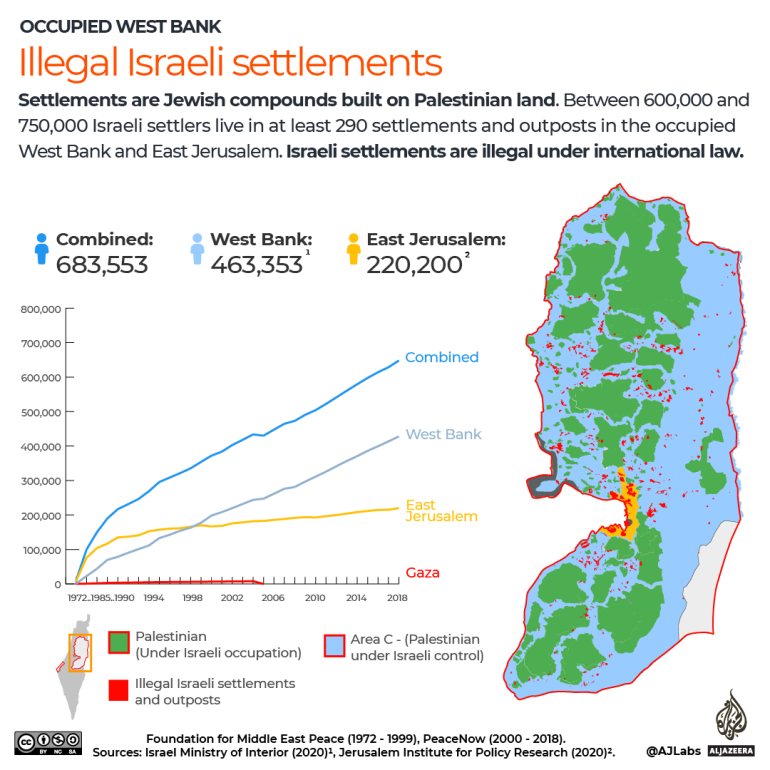Israel pushes for more illegal settlements in occupied West Bank amid raids
Plans to expand in the E1 area east of occupied East Jerusalem would bisect area and isolate Palestinian communities.

Published On 6 Aug 20256 Aug 2025
Israeli authorities are moving forward with plans to dramatically expand illegal settlements in the occupied West Bank, despite growing international condemnation and warnings that the move would destroy already moribund prospects for a two-state solution.
The Israeli government has set Wednesday as the date to discuss building thousands of new housing units in the E1 area, east of occupied East Jerusalem. The proposed expansion would link the large and illegal Ma’ale Adumim settlement with Jerusalem, effectively bisecting the West Bank and isolating Palestinian communities.
Recommended Stories
list of 3 itemsend of list
Israeli Prime Minister Benjamin Netanyahu’s far-right government also appears on the cusp of announcing its intention to occupy all of Gaza as its genocidal war on the besieged enclave rages on.
The E1 plan in the West Bank has long been criticised by the international community, including the European Union and successive United States administrations. In 2022, Israel postponed the plan following US pressure, but in recent months, the government approved road-widening projects in the area and began restricting Palestinian access – a move rights groups say indicates a renewed push to entrench control.
Israeli settlements in the West Bank and East Jerusalem are illegal under international law. The International Court of Justice, the top United Nations tribunal, reaffirmed that position last year, saying that Israel’s presence in the occupied Palestinian territories is unlawful and must end “as rapidly as possible”.

On Monday, Germany reiterated its strong opposition to the E1 project.
Advertisement
“We, as the federal government, strongly reject the E1 settlement project,” Foreign Ministry spokesperson Kathrin Deschauer said. “What we are concerned about is that a two-state solution is possible in the long term.”
The plan would see nearly 1,214 hectares (3,000 acres) of Palestinian land stolen to build more than 4,000 settlement units, as well as hotels and roads connecting Ma’ale Adumim to West Jerusalem.
Palestinians say the project is part of broader efforts to “Judaise” East Jerusalem and entrench Israeli control over occupied territories in violation of international law.
Palestinian leaders seek the entirety of the West Bank, along with the Gaza Strip, and as a capital, East Jerusalem – areas Israel captured in the 1967 war – for their future state.
Currently, more than 500,000 settlers are living in the West Bank, and some 220,000 others in East Jerusalem.
Al Jazeera’s Nida Ibrahim said the plan has been in the works since “the early 90s”.
“The plan has been described by US officials … as devastating and a disastrous plan,” Ibrahim said, as it threatens “the unity” of a potential Palestinian state.
According to Ibrahim, the Israeli objective is to ensure there is “no Palestinian state on the ground” by the time Western and European countries recognise Palestine as a state.
Israel would be “cutting the West Bank into so many different sections, fragmenting them, creating what Palestinians have been calling as cantons,” she said, predicting that his would push Palestinians into “very small, caged communities”.
Widening crackdown in the West Bank
The move comes amid a broader Israeli crackdown in the occupied West Bank. At least 30 Palestinians were arrested overnight across multiple cities including Hebron, Nablus, Bethlehem, Ramallah, and Tulkarem, according to the Palestinian Authority’s Commission of Detainees and Ex-Detainees Affairs.
Among those detained were two women, a female journalist, and several former prisoners. The commission said more than 18,500 Palestinians have been arrested in the West Bank since Israel began its genocidal assault on Gaza in October 2023.
In Bethlehem, residents of Beit Iskaria village received forced displacement notices this week as Israeli forces moved to seize more land for settlement expansion in the Gush Etzion bloc. According to village council head Muhammad Atallah, soldiers ordered him and his family to vacate grapevine-covered farmland within 10 days.
Separately, Israeli forces carried out demolitions in the agricultural suburb near Jalazone refugee camp north of Ramallah, with reports that soldiers were accompanied by settlers. In Dar Salah, east of Bethlehem, a building under construction was demolished by Israeli military vehicles.
Advertisement
According to rights groups, July alone saw 75 demolitions in the West Bank targeting 122 structures, including 60 homes and dozens of agricultural and livelihood facilities.
Along with arrests and demolitions, Palestinians have also seen a rise in settler attacks in recent months. Armed settlers, often backed by Israeli soldiers, have rampaged through Palestinian villages, torched crops, vandalised homes, and assaulted residents with impunity, resulting in several Palestinian deaths.
Rights groups and United Nations officials have warned that settler violence has reached record levels, part of what they describe as a coordinated campaign to forcibly displace Palestinians from key areas of the West Bank.
Meanwhile, Israeli authorities issued a six-month ban on Sheikh Muhammad Hussein, the grand mufti of Jerusalem and the Palestinian territory, from entering Al-Aqsa Mosque.
According to the Wafa news agency, the Jerusalem governorate, quoting lawyer Khaldoun Najm, said the ban on Hussein follows the expiration of his eight-day ban.
This most recent ban was imposed after his Friday sermon, where he condemned Israel’s starvation policy against Palestinians in Gaza.
Last week, Hussein was handed an initial eight-day expulsion order from the mosque.